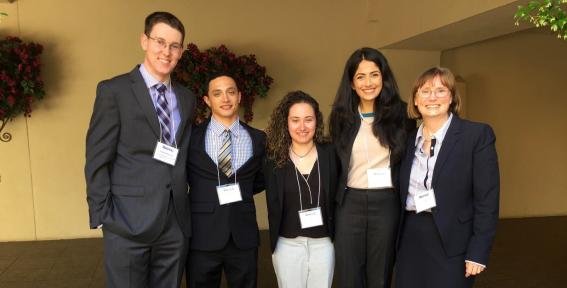Student Team "Does the Right Thing" in International Business Ethics Competition
May 15, 2017

In late April, a team of Isenberg undergraduates excelled in the International Business Ethics Case Competition (IBECC) in Santa Monica. The students—Nikhila Nandgopal, Nicole Moschella, Zachary Gross, and Patrick Bannon—placed first for their 10-minute presentation, second for their 90-minute presentation, and second in the “Ethics Biathlon,” which combined a four mile run with the ethics portion of the competition. The teams’ faculty advisor was Isenberg Senior Law Lecturer Jennifer Merton.
The Isenberg students competed in a field of undergraduate registered teams from 25 colleges and universities. Teams hailed from the University of Illinois, Loyola Marymount, the University of Florida, Texas State, the University of Oxford (UK), the University of Melbourne, and many other schools. The competition also included a graduate-level division.
In the IBECC, student teams generate/choose their own case for exploration. That includes a universe of topics, although for the 2017 competition, the competition encouraged teams to consider two timely issues: gun deaths in the United States and the spread of “fake news” via emerging technologies. Regardless of topic, the competition required that it “relate directly to an issue faced by a company or industry.”
“Our Isenberg team members embodied ethical conduct themselves." For their case, the Isenberg students researched Nestle Waters North America (a division of Nestle), focusing on water scarcity and the ethical conflict between Nestle’s right to extract water and the community’s right to access it. The team’s recommendations advised Nestle on how it could improve its siting and extraction decision making, notably during drought conditions in the communities where it operates. The team also explored securities law reporting trends and recent cases that make truthful reporting ethical, legal, and strategic requirements.
“I was very proud of the team’s hard work and success, but most proud of the genuine regard of its members for one another and for the team as a whole,” recalls Professor Merton. That included, she added, respect for competing teams. “Our Isenberg team members,” she emphasized, “embodied ethical conduct themselves. They will be real assets to the business community as future professionals!”